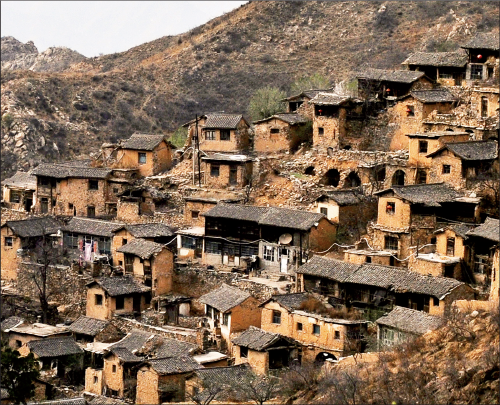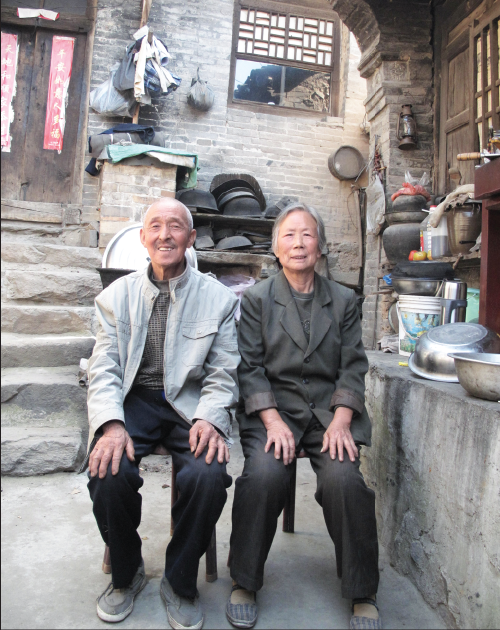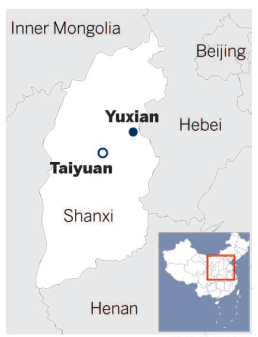
LIU DEJUN/CHINA DAILY
Dachang village in Yuxian county, Shanxi province, is known for its nearly 100 two-story houses perched on a steep slope.

LI YANG/CHINA DAILY
Han Shuangniu and his wife Liu Qiaoxiu operate a small family inn in the village.

CHINA DAILY
A visit to the rustic village of Dachang is like traveling back in time. Li Yang takes you on a journey through the ages to Yangquan, Shanxi province.
Time freezes in Dachang, a 1,000-year-old village in Yuxian county of Shanxi province. The same can be said about the lives of the 16 villagers, two cats, one dog, some 30 chickens and 70-plus goats.
But after China Central Television broadcast a documentary film on Dachang one year ago, hundreds of travelers, painters and photographers flocked to the once obscure spot.
"Simplicity is the nature of life and happiness," a traveler from Beijing says, sighing satisfactorily after staying in Dachang for a week. But there are also others who returned disappointed after a two-hour visit.
The village's nearly 100 two-story buildings, made of local wood, bricks, tiles, stones and mud, are well positioned on a steep slope of the Taihang Mountain range, with their facades facing the southern valley.
There are no other signs of human life within four hours' trudge over the bumpy dirt path in the droughty mountains. The village sticks out against the surrounding desolation.
The village's buildings, which are different from the one-story flat-roof houses in Shanxi, were built by the descendants of an official family in the Song Dynasty (960-1279) who fled from wars in South China and settled on the mountain slope rich with spring water.
Photographers and painters compare the village to the looks of the Potala Palace on a mountain slope in Lhasa of the Tibet autonomous region.
"It looks the best after snow or in dusk or dawn, when the changing of light enriches the layers of the view and welds the mud-yellow village to the earth-tone mountain slope," says a watercolor painter from Tianjin.
There were more than 300 people in Dachang during its prime in the late 1970s, living on potatoes, grains and carrots planted in meager plots. After the reform and opening-up of China in 1978, young people started migrating to cities, leaving only 16 villagers ages 65 to 90.
"They simply do not want to move to live with their children in cities," says Han Guoyin, the 50-year-old former village head.
"They take care of each other and lead self-sufficient lives. Their children usually give them some money through me."
Han drives his motor-tricycle to deliver daily necessities to Dachang every two weeks.
The old villagers from 10 families treat one another like family members. They do almost everything together, such as working on the farm, celebrating festivals and worshipping ancestors.
"As long as I can take care of myself, I feel happy," says Han Shuangniu, a 78-year-old villager operating a small family inn with his 75-year-old wife Liu Qiaoxiu.
He charges 20 yuan ($3.3) for a night's stay and 5 yuan for each meal cooked by his wife, mainly comprising pumpkin, millet congee, potato, carrot and homemade noodles.
"I plant the vegetables and grains myself. I don't use any pesticides or chemical fertilizer. I am happy the city people love our diet so much," Liu says, with a strong local accent.
"I like visitors. They bring vitality to the dying village. But I find they tend to buy, or even steal, everything old in the village-a basket, a candlestick, a lever scale, a wooden windowsill or even a rotten door threshold."
Han Shuangniu is also in charge of cleaning the visitors' household refuse.
"I can only burn the refuse. I am afraid I cannot handle the rubbish as more travelers come here," he says.
There used to be families of tofu makers, shoemakers, millers, opera actors, masons, blacksmiths, doctors, carpenters, teachers, musicians, hairdressers and tailors in Dachang before the 1970s.
Han Shuangniu says after the last carpenter died one year ago, "we do not have professionals anymore. We have to learn to do the stuff ourselves."
Han Shuanyou, 65, is the only professional flockmaster. He's responsible for herding the 70 goats owned by the 16 villagers, including his, because he is the youngest.
"It is not an easy job," he complains, calling himself "the only public property manager". The wild dogs, eagles and the other predators attack the goats, which are much harder to herd than sheep.
According to the villagers, the unhappiest time of the village was during the War of Resistance against Japanese Aggression (1937-45).
"One of my uncles was killed on his way to a fair in the town. The other one survived by feigning death among corpses and came back at night," says Han Shuangniu.
"The county and town heads all fled the war to our village, which was a natural shelter because of its remoteness."
Yet for the old villagers, singing the guerrilla songs deploring the Japanese invasion remains good entertainment, along with the other local operas.
As for the great famine in the early 1960s and the "cultural revolution" (1966-76) that swept across China, the villagers joke that the events seemed so distant from them.
The county government organizes free medical checks every year for Dachang. But doctors have found most villagers to have a fairly clean bill of health.
"Most of the old guys passed away peacefully in their sleep and continue to 'sleep' on the mountains," Han Shuanyou says. "They work until the last day of their lives."
One-fourth of the deserted old houses in Dachang have collapsed. Han Shuangniu says emotionally: "After we all go to sleep in the mountains, Dachang will disappear."
Contact the writer at liyang@chinadaily.com.cn.
Sun Ruisheng contributed to this story.
IF YOU GO:
Dachang is two hours by off-road vehicle from Yuxian county, 60 kilometers north of Yangquan city in eastern Shanxi province.
It's available to stay in the village for several days. The cost is low, the food is healthy and the air is fabulous,making it a convenient place for the dwellers of smoggy cities in North China to refresh their lungs.
We recommend:
